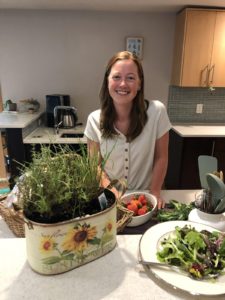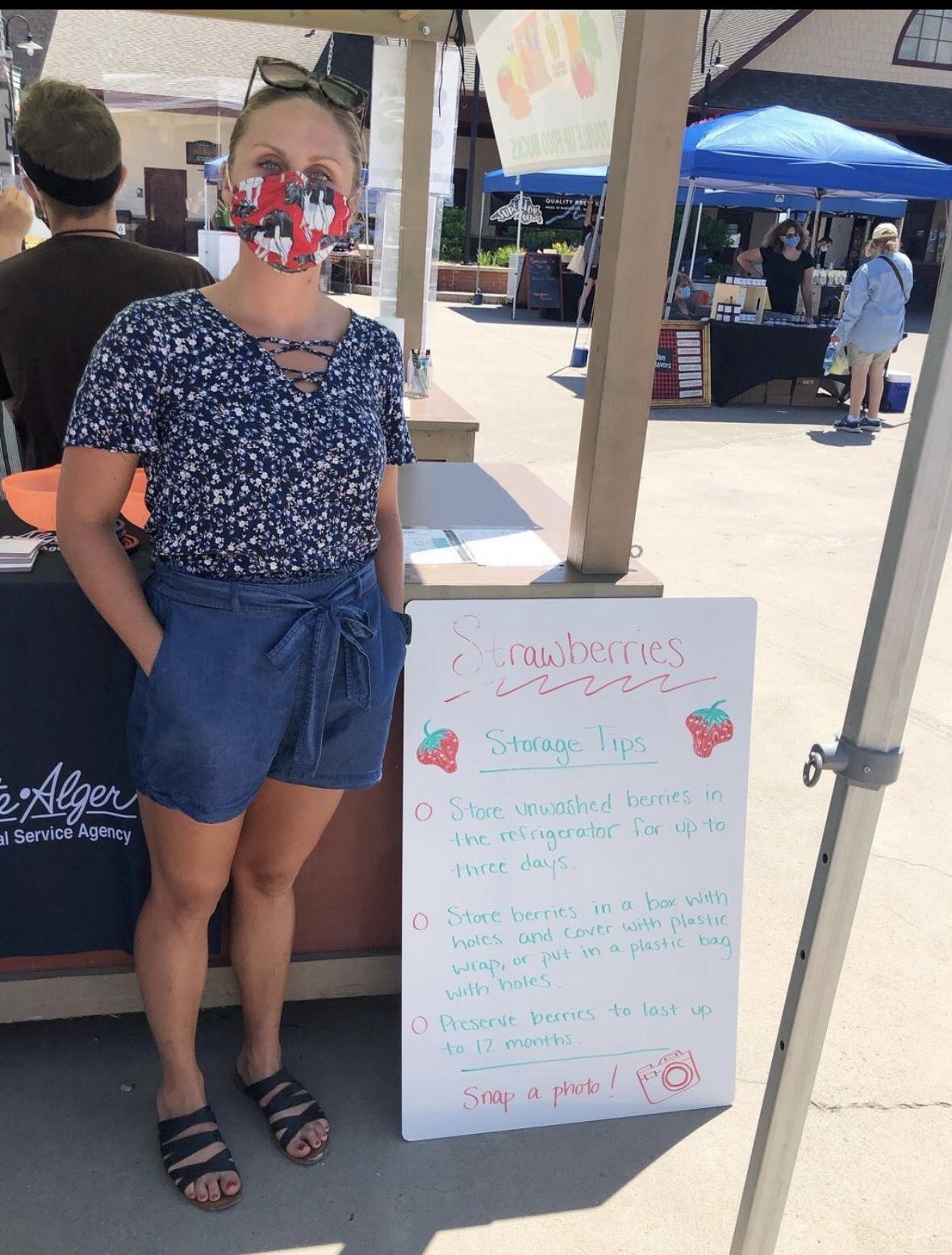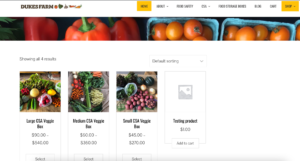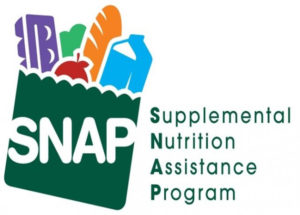This article highlights Dukes Farm’s Farm to Family CSA, available to families on food assistance.
by Estelle Slootmaker
June 21, 2021
 First piloted in one location in 2019, MFF will have eight locations for this summer’s growing season. Over the next four years, MFF will increase that number to 17.
First piloted in one location in 2019, MFF will have eight locations for this summer’s growing season. Over the next four years, MFF will increase that number to 17.
“CSAs have really great food, though participating is hard for some because of the upfront cash outlay,” says Jane Whitacre, MFF project manager. “Why should this food only go to people with lots of money in their savings account?”
MF2FCSA is made possible through a $500,000 grant from the National Institute of Food and Agriculture (NIFA) through the Gus Schumacher Nutrition Incentive Program (GusNIP). GusNIP provides funding opportunities for projects providing incentives to increase the purchase of fruits and vegetables by low-income consumers.
MF2FCSA’s nutrition education component is made possible through MFF SNAP-Ed grant funding. MFF is a State Implementing Agency of the Michigan Department of Health and Human Services for the education component of SNAP-Ed. SNAP-Ed is an education program of the U.S. Department of Agriculture that teaches people eligible for SNAP how to live healthier lives. MFF offers competitive grants to conduct SNAP-Ed programming throughout the state of Michigan. This includes grants to local organizations who help coordinate MF2FCSA shares between farms and families in their communities and provide nutrition education to participating families.
By bringing the programs together, MFF is able to increase the purchase of fruits and vegetables for families in an affordable way, support local farmers, and provide nutrition education.
In a typical CSA model, members purchase a share at the beginning of the growing season. The full CSA share can cost up to $500 or more, which creates a financial hurdle for many families. Through MF2FCSA, MFF pays three-quarters of the CSA cost to the farmer while families pay only $5 a week, and the families are able to pay on pickup using SNAP benefits if desired. As a result, MF2FCSA removes the barrier to participation and provides families with an affordable way to access fresh produce.
“Having these kinds of resources gives people hope,” Whitacre says. “Hope that they can take care of their families, they can take care of their kids. Hope that they have opportunities and resources that can help them, and they’re not stuck by themselves. Everybody needs that hope.”
MARESA and Dukes Farm build hope in Marquette and Alger counties
One of this summer’s new MF2FCSA programs will be coordinated by the Marquette-Alger Regional Educational Service Agency (MARESA). MARESA has implemented MFF SNAP-Ed programming for eight years now. At the core of MARESA’s SNAP-Ed interventions is MFF’s Physical Education and Nutrition Working Together (PE-Nut) program, which brings physical activity and healthy eating activities into 18 elementary school classrooms throughout Michigan’s central Upper Peninsula.

MARESA also participates in MFF’s Farmers Market Food Navigator program. Food Navigators give personalized tours, introductions to vendors, and explain the food assistance programs available at the market. Serving the Escanaba Farmers Market and Downtown Marquette Farmers Market, the food navigators also offer food budget tips and ways to prepare healthy foods with fresh, local produce from regional farmers.
The MF2FCSA program will provide up to 30 families in the region with a share in Dukes Farm, a 40-acre family farm in Skandia, about 20 miles southeast of Marquette. Farmer Gabriel Caplett grows food for CSA members, wholesale customers, and customers ordering from an online store that delivers to Marquette, Negaunee, and Ishpeming.
“With the CSA program, we’re really trying to connect the farm with families so they can eat local food in season,” says Rachel Bloch, MARESA’s health education consultant and MFF SNAP-Ed program lead. “Getting the produce boxes from Gabriel will help people learn and understand all of the produce that can grow in the UP.”
Families who participate in the MF2FCSA program will pay $5 a week for a produce box chock-full of just-picked vegetables that would cost $20 or more at the farmers market. They will also have the option of picking up their produce boxes at the farm, having them delivered to their homes, or to nearby drop-off locations.
“One of the biggest challenges is that some of our communities are very rural. Transportation to get to the farmers market or a grocery store can be an issue. Instead, people sometimes eat from the gas station stores,” Bloch says. “Our goal for the CSA program is to get families signed up so they can have that experience of enjoying healthy, fresh, local food in season. Another goal is to help families learn how to use every item of food in their box.”
MARESA will offer food demonstrations, either face-to-face or virtually, to encourage families to use every piece of food in their box. MARESA will also provide participating families with recipes from MFF’s Michigan Harvest of the Month™ website, which has a primary focus on cooking with fruits and vegetables.
“It’s pretty amazing to think about, but during the pandemic, when people went to the grocery store, produce was not often available,” Bloch says. “This showed us how important local food is and how valuable it is.”
Health wanted: Apply today!
To recruit families for the CSA, Bloch is reaching out to families that MARESA already works with, specifically mothers. Many of these are young families with preschool-aged children, so a starting point has been the local Michigan Head Start program.
“Moms make the food decisions in households. As Head Start works with low-income families that have kids in preschool-age programs, we thought it would be a place to start,” Whitacre says. “Head Start has been very intentional in helping these households access better food, especially because of COVID. A lot of people have been isolated and struggling to make ends meet, getting food from different programs.”
Even so, MARESA is still looking for more families to become MF2FCSA shareholders.
“It hasn’t been easy to find 30 people to join the CSA. Right now, 10 people are signed up. We want this to help the farmer as much as the families who need the food,” Whitacre says. “This program has never been done here before. We’ll learn together how to best deliver it. We try things, be persistent, and keep building the path while we’re walking on it.”
Whitacre notes that because MFF is located in Lansing, relationships with community partners like MARESA, local schools, and local farmers are what have made MFF’s programming across Michigan a success.
“We want to have organizations who are working in their own communities involved with our programs. It’s a really important connection that helps build comfort and helps everybody succeed,” Whitacre says. “Gabriel is really good at growing food and selling food. MARESA can help Gabriel by promoting the MF2FCSA program to people and letting them know it’s an option. So, we all kind of come together in this this productive, small food ecosystem in the UP of Michigan.”


